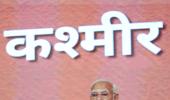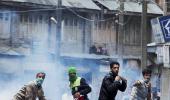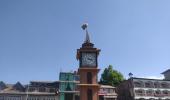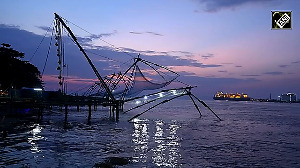'With all outlets of public expression virtually choked for the last five years, suppressed anger and frustration is looking for an opening via the ballot box.'
'There is no escape from the inevitability of the 'Engineer Rashid' factor surfacing in a big enough way to upset everyone's applecart,' alerts Mohammad Sayeed Malik, the veteran commentator on Kashmir affairs.

The fifth anniversary of 'August 5, 2019', when the erstwhile state of Jammu and Kashmir was Constitutionally mauled and cut to size is being marked with the prospect of early Assembly elections and against the backdrop of a worrisome security scenario.
The Bharatiya Janata Party's unsatisfactory performance in the 2024 Lok Sabha elections had given rise to apprehension that the assembly poll -- the last one was held ten years ago -- might be further delayed.
But the latest indications suggest that wiser sense might prevail and the process completed within the September timeframe set by the Supreme Court.
Also, frequent occurrence of security-related incidents in supposedly safe areas of Jammu region had added to the apprehension that it might be used as a pretext to put off the assembly elections.
More so, after the unceremonious removal of the BSF chief and his immediate next in command.
Doubts about a definite election date gained currency soon after the BJP performed poorly in the just concluded Lok Sabha elections.
The party lost the solitary Ladakh seat it had won in 2019 and polled far less votes in the two (Jammu region) constituencies, compared to its score in the 2019 elections.
Contrary to expectations aroused by the BJP government's bold action on August 5, 2019 the party in power at the Centre developed cold feet and totally abdicated the field in the Kashmir Valley which accounts for three Lok Sabha seats.
The miserable performance of its local proxies was another dampener. Some of them are showing signs of disintegration.
More importantly, even the National Conference suffered a loss of face in Baramulla constituency where former chief minister Omar Abdullah was defeated by his Independent rival Engineer Rashid by an embarrassingly huge margin. New Delhi-blessed Sajad Lone of the Peoples Conference was barely able to save his deposit.
While the National Conference was able to retain the other two seats in the Valley -- Srinagar and Anantnag -- the Peoples Democratic Party came a cropper.
Nonetheless, the overall poll percentage of the National Conference and the Peoples Democratic Party was far better than that of New Delhi-blessed smaller groups all but one of whom forfeited their security deposit.

The last assembly elections in the then Jammu and Kashmir state -- and now a Union Territory -- were held in 2014.
The respective tally out of the 87 seats including 4 in the Ladakh region then was: PDP (28), BJP (25) and NC (15).
The number of seats has since gone up after delimitation to 90 seats; 47 in the Valley and 43 in Jammu.
Events following August 5, 2019 have rendered the Valley's political field almost an unrecognisable wasteland.
Artificially planted groups have failed to strike roots and are beginning to wither away under the impact of their very first disastrous encounter.
Even the seemingly comfortable regional parties like the National Conference and the Peoples Democratic Party find themselves bereft of a post-August 5, 2019 political narrative.
Their political edifice was based on more or less a common foundation of autonomy and Article 370, both of which have gone with the wind.
How much of that refrain still carries conviction with the electorate would be clearer after the assembly elections.
The 'Engineer Rashid' phenomenon puts a big question mark on the probable prospects of contending rivals.
The youth factor has shown its capability to drastically alter the format of the UT's electoral calculus.
That, however, is apart from its inevitable political implications.
The BJP with its untested local flock in the Kashmir Valley has no option but to jump into the fray and field its nominees in the assembly elections rather than pushing its allies to burn their fingers.
While Jammu can be claimed by the BJP as its home ground on the basis of its grand performance in the 2014 polls it is in the Kashmir Valley where it stands to be tested, more so after having left nothing to chance in levelling the ground for self-comfort.
The party goes into the fight without any footprint.

In 2019, the BJP's post-poll alliance with the PDP had enabled it to share its maiden entry in the J&K power structure.
As they say, 'Once the camel got its nose in the tent it did not take too long to get its body in'. The rest is history.
Since then, the BJP's strategists have put in place a plethora of social categories entitled to administrative privileges, hoping it would yield electoral dividends.
Surprisingly, nothing like that happened, at least visibly, in the parliamentary elections.
Whether the assembly elections produce a different calculus will have to be seen.
Coming to power in J&K would politically mean crowning glory for the BJP of which it has long been dreaming and after August 5, 2019, planning so meticulously.
At the other end of the spectrum, however, there is no escape from the inevitability of the 'Engineer Rashid' factor surfacing in a big enough way to upset everyone's applecart, not excluding the erstwhile surefooted contestants.
With all outlets of public expression virtually choked for the last five years, suppressed anger and frustration is looking for an opening via the ballot box.
The Lok Sabha elections have amply conveyed that message. Long suppressed grievances have been simmering below the surface.
During the past few years, the Union government has had a virtual free run across Constitutional, administrative and political fields, making drastic statutory and other changes and experimenting with odd combinations while holding the UT and its people under a tight leash curbing any resistance or voice of protest.

Politics and elections apart, the security scenario in the UT, notably in the Jammu region, is quite disturbing.
Unofficial reports say that highly trained infiltrators armed with sophisticated modern weaponry and the latest model of communication equipment have been hiding in the thick forest areas of Doda, Poonch and Rajouri areas.
Sporadic attacks have so far claimed 47 lives from among the security forces.
Sudden replacement of the Border Security Force's top-most leadership adds to fears that all is not well here.
Jammu was so far considered to be relatively safe. But not any more.
Recent summary removal of the BSF chief and his immediate deputy underline the seriousness of the security problem.
More so, as it mainly pertains to Jammu region which was considered to be immune to this kind of trouble, most certainly not of this magnitude.
Mercifully, the Kashmir Valley has been safe and quiet. Tourism is at its peak.
The two month-long Amarnath Yatra is nearing its without any untoward interruption.
Feature Presentation: Aslam Hunani/Rediff.com











 © 2025
© 2025